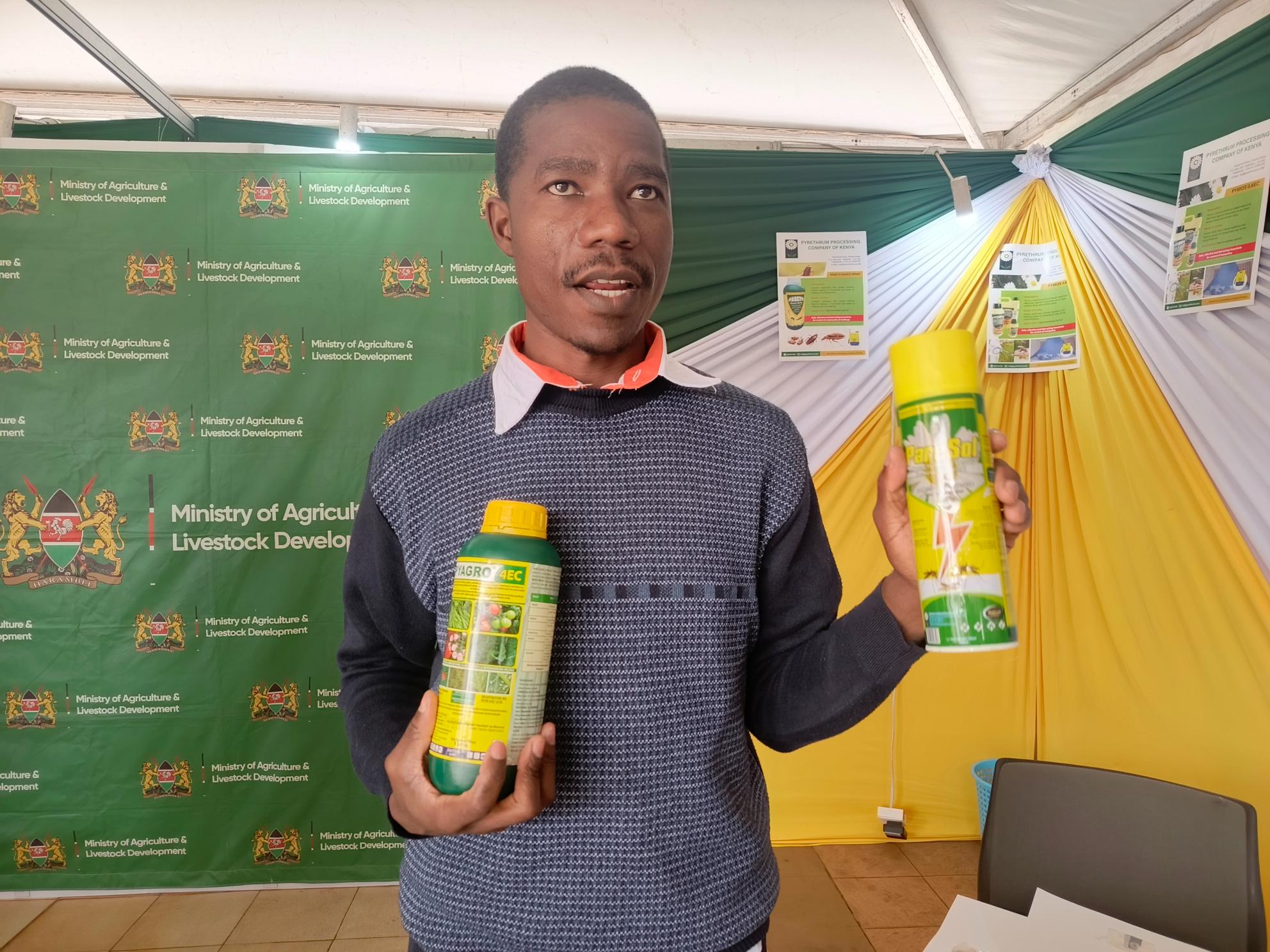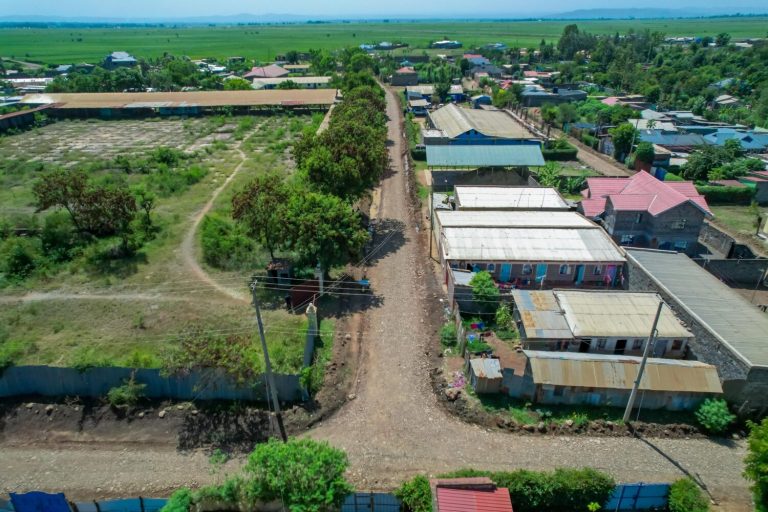Cyrus Nderitu from Kieni, Nyeri county, vividly remembers his childhood in the 1990s when pyrethrum farming was part of their daily life.
“When we weren’t in school, my younger sister and I would spend weekends and school holidays plucking pyrethrum flowers,” he recalls with a smile. “It was part of our routine back then, and pyrethrum farming was thriving.”
But things changed. Collection centres where farmers delivered dried flowers began to close one after another, and soon, many abandoned the crop altogether.
Now, decades later, pyrethrum farming is slowly making a comeback, this time through contract farming. “We are guaranteed a ready market, fair prices and even receive seeds at subsidised rates. After delivering the dried flowers, payment is processed within 24 hours through an automated system,” Nderitu says.
He notes that the crop is easy to manage. “Once planted, pyrethrum doesn’t need much—just regular plucking and weeding. We don’t use fertilisers or chemicals because they lower the pyrethrum content and can harm bees.”
However, Nderitu points out that changing weather patterns have made water and farmyard manure increasingly important for better yields. “With the erratic rains these days, you need to supplement with a bit of irrigation or manure to get good production,” he says.
At the 5th National Agribusiness Summit in Nairobi, Collins Omondi’s stand at the Pyrethrum Processing Company of Kenya (PPCK) was a crowd-puller. On display were bright bottles of eco-friendly insect sprays made from locally grown pyrethrum, this proves that the revival of the crop is not just about farming, but innovation too.
Omondi, a Product development assistant at PPCK, proudly showcased the company’s range of organic, locally produced pest control solutions.
They are producing safe, natural and effective products for insect control. “Our pyrethrum-based sprays have zero chemical residues, meaning farmers can sell their produce within a day of application,” Omondi says.
Farmers like Nderitu are once again finding hope in the small white flowers that was once a cash crop.
The PPCK, formerly the Pyrethrum Board of Kenya, has introduced a new generation of environmentally friendly pesticides targeting mosquitoes, cockroaches and other household pests. The initiative is part of a broader national effort to revive pyrethrum as a key cash crop, creating income for farmers while offering sustainable, homegrown alternatives to synthetic pesticides.
Among PPCK’s flagship products are Pyagro, a pesticide used to control pests in fruits and vegetables; Paresol for mosquito control; Pareto Roach, for cockroaches and bedbugs; and Pymos, a residual spray used in malaria control programmes.
Omondi said half of the company’s pyrethrum extract is exported, while the rest is used locally for value addition. “When you buy these products, you’re supporting Kenyan farmers, because they are grown, processed and manufactured here,” he added.
The PPCK is encouraging farmers across 19 counties to return to pyrethrum cultivation, citing attractive farm-gate prices ranging between Sh300 and Sh750 per kilo of dried flowers.
“Pyrethrum farming puts money directly into farmers’ pockets,” Omondi said. “With good management, one acre can yield between 80 and 100 kilos of dry flowers per month, earning a farmer about Sh30,000 on average.”
Counties suitable for the crop include Nakuru, Nyandarua, Kericho, Bomet, West Pokot, Uasin Gishu, Nyeri, Laikipia and Meru, among others. The crop thrives in cooler, high-altitude areas, with higher pyrethrum content and therefore higher prices recorded in colder regions.
Kenya was once the world’s leading producer of pyrethrum, exporting to markets in the US, Europe, China and South Africa. But the sector collapsed in the 1990s due to mismanagement, delayed payments to farmers and competition from synthetic pesticides.
“We lost some of our export markets due to strict regulations and outdated processing technology,” Omondi explained. “But we’re now modernising our systems and working to regain those markets.”
To lower the cost of production and encourage new farmers, PPCK offers seedlings, training and extension services. “For those without enough capital, we encourage inter-farm transplanting, where farmers share and multiply existing bushes,” Omondi said.
Starting costs range from Sh60,000 to Sh100,000 per acre, depending on input and labour costs.
He said once planted, pyrethrum takes about six to eight months to mature, with harvesting done every two weeks. A well-managed crop can continue producing for up to four years before requiring replanting or regeneration.
Speaking at the same summit, Agriculture Cabinet Secretary Mutahi Kagwe announced plans to open more than 1.5 million acres of land for private sector investment in key value chains, including pyrethrum.
“We spend about Sh500 billion every year importing food. If we produce locally instead of importing, we will save foreign exchange, stabilise the shilling and strengthen the economy,” Kagwe said.
He added that the government is preparing land under the Agricultural Development Corporation, prisons and county governments for commercialisation. The move is part of a broader shift to transfer agricultural enterprises, such as sugar and pyrethrum, from government to private management for greater efficiency.
“This is not by mistake, it is policy,” he said. “We are moving sugar and pyrethrum from government management to private sector management.”
Omondi added that they are committed to ensuring farmers are paid on time and that Kenya reclaims its position as a top global producer.
“When farmers grow pyrethrum and use pyrethrum-based products, they’re not just earning, they’re helping the environment and supporting a proudly Kenyan industry,” he said.
by AGATHA NGOTHO













